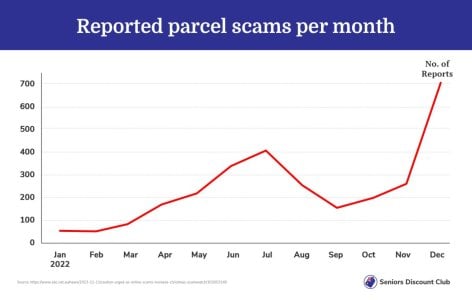Be vigilant: How to avoid online frauds ahead of Christmas
The lure of online shopping is hard to resist when discounts are up for grabs—especially in the upcoming months. However, as the festive season approaches, the Australian Competition and Consumer Commission (ACCC) urged consumers to be extra vigilant when shopping online.
This period is a prime time for fraudsters, with a significant increase in scams reported during the months leading up to Christmas.
In 2022, October and November were the peak months for scams, with almost 50,000 reported to Scamwatch. The Australian Communications Consumer Action Network (ACCAN), a leading advocacy group for communications consumers, anticipates a similar trend this year.
'Unfortunately, we do anticipate there will be a higher proportion of scamming through the Christmas period,' ACCAN Chief Executive Andrew Williams stated.
Scamwatch’s website, run by the federal government, has already recorded nearly $400 million lost to fraudsters from January to September this year. However, this figure may only represent a small part of the overall problem.
Last year, Australians lost a staggering $3.1 billion to scams, an 80 per cent increase from 2021. This figure includes data reported to Scamwatch, ReportCyber, the Australian Financial Crimes Exchange, other government agencies, and support service IDCARE.
The number of scams reported to Scamwatch this year up to September has almost matched the total number of reports for 2022. Last year, 239,237 scams were recorded, compared to 234,663 reports this year to September.
According to Scamwatch, the majority of money stolen from Australians this year was through investment scams ($240 million), but phishing scams were the most commonly reported con (82,088 reports).
Heidi Snell, Executive General Manager of the ACCC National Anti-Scam Centre, warned that online scams are 'rife' at Christmas. Fraudsters are creating websites that mimic major brands and chains, which people often search for.
'There are a lot of fake stores out there. We see a lot of impersonations of bigger brands,’ she cautioned.
Grace Calma, Acting Commander of Australian Federal Police Cybercrime Operations, echoed this sentiment, stating that online scams are among the fastest-growing crime types in Australia.
'In this digital age, we’re seeing personal data become incredibly valuable to cybercriminals, who see it as information they can exploit for financial gains,’ she said.
Due to this, the ACCC has identified three main types of scams to be wary of this festive season:
1. Classified scams: These target people selling unwanted items via online marketplaces such as Facebook Marketplace. Scammers use fake profiles and impersonate PayID authorities, asking sellers to update details or send additional funds to allow a transaction to take place.
2. Online shopping scams: Thieves create near-perfect replicas of major retailers' websites to fool consumers.
3. Parcel scams: These scams take advantage of the fact that many people expect online shopping orders of gifts over the festive period. Scammers send consumers a fake text about a delayed package or one that requires payment for redirection. They subsequently ask for private information used to scam people by impersonating their bank.
The total amount of money lost to parcel scams this year to September ($706,834) is about 12.5 times the amount lost for the entirety of 2022 ($56,216).
Ms Snell shared, 'What we've seen is a realisation by scammers that this is a good scam to get onto and that it's effective.’
She continued: ‘People are falling for the initial phishing scam [link] and then realising that they have fallen for a bank impersonation scam as well.’
Andrew Williams, the Head of ACCAN, emphasised that scammers can target anyone. 'We've seen people from all walks of life [affected],' he said. '[It] doesn't matter what background, what socio-economic demographic you fit in, whether you're rich or poor, or whatever, whether you're old or young, scammers can impact you.’
So, how can you protect yourself from these scams?
1. Be cautious of unsolicited emails or texts: If you receive an unexpected email or text, especially one that asks for personal information or payment, be wary.
2. Verify the source: If you're unsure about an email or text, contact the company directly using a phone number or email address you know is legitimate.
3. Be wary of too-good-to-be-true deals: Scammers often lure victims with incredible deals. If a deal seems too good to be true, it probably is.
4. Use secure payment methods: When shopping online, use secure payment methods such as credit cards or secure payment providers like PayPal. Avoid wire transfers or gift cards, which are favoured by scammers.
5. Keep your devices and software up to date: Regularly updating your devices and software can help protect you from scams. Many updates include security patches that can protect you from known vulnerabilities.
6. Report scams: If you think you've been scammed, report it to the ACCC's Scamwatch here: https://www.scamwatch.gov.au/report-a-scam. This can help others avoid the same scam.

Remember, the best defence against scams is awareness and vigilance. Do you have other tips to avoid these types of scams, members? Share them in the comments below!
This period is a prime time for fraudsters, with a significant increase in scams reported during the months leading up to Christmas.
In 2022, October and November were the peak months for scams, with almost 50,000 reported to Scamwatch. The Australian Communications Consumer Action Network (ACCAN), a leading advocacy group for communications consumers, anticipates a similar trend this year.
'Unfortunately, we do anticipate there will be a higher proportion of scamming through the Christmas period,' ACCAN Chief Executive Andrew Williams stated.
Scamwatch’s website, run by the federal government, has already recorded nearly $400 million lost to fraudsters from January to September this year. However, this figure may only represent a small part of the overall problem.
Last year, Australians lost a staggering $3.1 billion to scams, an 80 per cent increase from 2021. This figure includes data reported to Scamwatch, ReportCyber, the Australian Financial Crimes Exchange, other government agencies, and support service IDCARE.
The number of scams reported to Scamwatch this year up to September has almost matched the total number of reports for 2022. Last year, 239,237 scams were recorded, compared to 234,663 reports this year to September.
According to Scamwatch, the majority of money stolen from Australians this year was through investment scams ($240 million), but phishing scams were the most commonly reported con (82,088 reports).
Heidi Snell, Executive General Manager of the ACCC National Anti-Scam Centre, warned that online scams are 'rife' at Christmas. Fraudsters are creating websites that mimic major brands and chains, which people often search for.
'There are a lot of fake stores out there. We see a lot of impersonations of bigger brands,’ she cautioned.
Grace Calma, Acting Commander of Australian Federal Police Cybercrime Operations, echoed this sentiment, stating that online scams are among the fastest-growing crime types in Australia.
'In this digital age, we’re seeing personal data become incredibly valuable to cybercriminals, who see it as information they can exploit for financial gains,’ she said.
Due to this, the ACCC has identified three main types of scams to be wary of this festive season:
1. Classified scams: These target people selling unwanted items via online marketplaces such as Facebook Marketplace. Scammers use fake profiles and impersonate PayID authorities, asking sellers to update details or send additional funds to allow a transaction to take place.
2. Online shopping scams: Thieves create near-perfect replicas of major retailers' websites to fool consumers.
3. Parcel scams: These scams take advantage of the fact that many people expect online shopping orders of gifts over the festive period. Scammers send consumers a fake text about a delayed package or one that requires payment for redirection. They subsequently ask for private information used to scam people by impersonating their bank.
The total amount of money lost to parcel scams this year to September ($706,834) is about 12.5 times the amount lost for the entirety of 2022 ($56,216).
Ms Snell shared, 'What we've seen is a realisation by scammers that this is a good scam to get onto and that it's effective.’
She continued: ‘People are falling for the initial phishing scam [link] and then realising that they have fallen for a bank impersonation scam as well.’
Andrew Williams, the Head of ACCAN, emphasised that scammers can target anyone. 'We've seen people from all walks of life [affected],' he said. '[It] doesn't matter what background, what socio-economic demographic you fit in, whether you're rich or poor, or whatever, whether you're old or young, scammers can impact you.’
So, how can you protect yourself from these scams?
1. Be cautious of unsolicited emails or texts: If you receive an unexpected email or text, especially one that asks for personal information or payment, be wary.
2. Verify the source: If you're unsure about an email or text, contact the company directly using a phone number or email address you know is legitimate.
3. Be wary of too-good-to-be-true deals: Scammers often lure victims with incredible deals. If a deal seems too good to be true, it probably is.
4. Use secure payment methods: When shopping online, use secure payment methods such as credit cards or secure payment providers like PayPal. Avoid wire transfers or gift cards, which are favoured by scammers.
5. Keep your devices and software up to date: Regularly updating your devices and software can help protect you from scams. Many updates include security patches that can protect you from known vulnerabilities.
6. Report scams: If you think you've been scammed, report it to the ACCC's Scamwatch here: https://www.scamwatch.gov.au/report-a-scam. This can help others avoid the same scam.
Key Takeaways
- Experts are advising online shoppers to exercise caution as scams increase in the lead-up to Christmas, last year's most productive months for fraudsters were October and November.
- Australians reported losing nearly $400 million to fraudsters from January to September this year via Scamwatch, which is predicted to increase over the festive period.
- The ACCC has identified three main types of scams to be wary of: classified scams, online shopping scams, and parcel scams.
- The total amount of money lost to parcel scams this year to September is 12.5 times the amount lost for the entirety of 2022.
Remember, the best defence against scams is awareness and vigilance. Do you have other tips to avoid these types of scams, members? Share them in the comments below!









